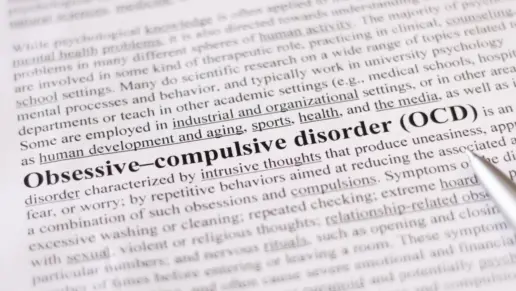Borderline personality disorder is a mental health disorder that can affect the way you feel about yourself and the world around you. It can include patterns of emotional instability, tumultuous relationships, and impulsive behaviors.
When someone is dealing with this specific diagnosis, they will have a strong fear of abandonment with personal and familial relationships.
Borderline personality disorder usually begins by early adulthood, but the condition is often most serious during the adolescent stage of life. People with borderline personality disorder can struggle on a day-to-day basis.
BPD involves significant dysregulation across the emotional, interpersonal, self, behavioral, and cognitive aspects of life.
Borderline Personality Disorder Symptoms & Criteria
Borderline personality disorder is often misdiagnosed and underdiagnosed – one research study showed that 40% of participants with BPD were previously misdiagnosed.
According to the Diagnostic Statistic Manual (DSM-5), there are nine criteria to help diagnose someone with this specific disorder.
To be diagnosed, you need to exhibit at least five of the following:
- Desperate efforts to avoid real or imagined abandonment.
- A pattern of unstable relationships switching between extremes of admiration and hatred.
- Unstable self-image.
- Impulsivity in at least two areas that are potentially self-damaging (such as spending, sex, substance abuse, reckless driving or binge-eating).
- Repeated suicidal behavior and threats or self-harm.
- Erratic mood swings.
- Chronic feelings of emptiness.
- Intense anger or difficulty controlling anger.
- Temporary, stress-related paranoid ideation or dissociative symptoms.
Borderline Personality Disorder vs. Bipolar Disorder
Although both BPD and bipolar disorder have mood instability in their symptomatology, they are vastly different in how they impact a person. The biggest difference is what causes the change in mood swings.
When someone has bipolar disorder, their mood swings happen during episodes such as manic or depressive states. These manic or depressive episodes may last for weeks or months.
With borderline personality disorder, these mood changes can be triggered at any time and you will typically cycle through them quickly. In both bipolar disorder and BPD, emotions can be intense and behaviors erratic.
Each person is different in how they view their symptoms and the impact it plays on their daily life. As far as treatment is concerned, if you are diagnosed with bipolar disorder, you will be treated with psychotherapy with a combination of medication such as mood stabilizers or antipsychotics.
If you are diagnosed with Borderline Personality Disorder, you will primarily be treated with psychotherapy.
FAQs
If you feel like you are struggling with symptoms related to BPD, you can talk to your primary care provider. However, it’s equally as important to discuss this with a licensed mental health provider.
You will complete assessments that rule out other possible diagnoses. Additionally, the assessments will involve being asked about your thoughts and feelings and how you are managing your day-to-day life.
Right now, there are no medications that treat BPD specifically. However, if you are struggling with specific symptoms such as depression, impulsiveness, aggression, or anxiety, you could be prescribed antidepressants, antipsychotics, or mood-stabilizing drugs to help manage those symptoms.
When someone is diagnosed with BPD they might have a black or white, all or nothing thinking process. This is known as splitting. It’s best described as the inability to hold opposing thoughts, feelings, or beliefs. Splitting can be considered a defense mechanism for someone with BPD.
Someone with BPD can have healthy relationships with friends, family, and significant others but it does take work within yourself and with a professional. In some cases, someone with BPD will have short-lived relationships which can have an impact on trust and the ability to form longer-term relationships in the future.
It is also important for the people you love to understand BPD to help provide you with a positive network of support.
Talk therapy is considered to be the best therapy option for someone with BPD. Talk therapy can help you focus on your ability to function, learn how to manage emotions, reduce your impulsiveness, and work on your relationships. Types of talk therapy include dialectical behavioral therapy (DBT), cognitive behavioral therapy (CBT), and schema-focused therapy.
What Causes BPD?
There is no single exact cause for borderline personality disorder. It is usually caused by a combination of factors.
Genetics can be one of them. Certain genes that you get from either parent can make you more vulnerable to developing BPD.
In some cases, an imbalance of neurotransmitters in the brain, specifically serotonin, can contribute to BPD. Studies have shown that altered levels of serotonin have been linked to depression, aggression, and difficulty controlling destructive urges.
Brain development has also been linked to one of the causes of BPD. MRI studies have shown that in people with BPD, three parts of their brain were either smaller or had unusual levels of activity. The three parts of the brain include the amygdala, the hippocampus, and the orbitofrontal cortex.
Lastly environmental factors are a common factor in those diagnosed with BPD. Environmental factors include being a victim of emotional, physical, or sexual abuse. For some it can include experiences they had as a child such as being exposed to long-term fear or distress and being neglected by one or both parents.
Borderline Personality Disorder Treatment and Therapies
Alongside talk therapies such as DBT and CBT, it is important to understand your symptoms and take care of your needs. These therapies are able to help you change your negative thoughts and views of the world and yourself.
In some cases, inpatient hospitalizations can be beneficial to help with stabilization and help you deal with your symptoms in a safe, direct manner. Support groups can also be beneficial by connecting with others that are dealing with similar struggles.
If you’re exploring therapy programs or supportive environments for long-term stabilization, you can also learn more about rehab options to see what types of treatment settings may be a good fit for your needs.
Nearby Addiction Centers That Treat Dual Diagnosis
Finding facilities near you…
Because many people with BPD also face challenges like substance use or difficulty accessing consistent care, it can help to review what your insurance may cover for mental health and dual diagnosis support. You can learn more about rehab options to understand what treatment benefits might be available through your plan.





